
O F
T H E
Q U E S T
O F
T H E
G O L D E N
F L E E C E
P A R T
E I G H T ,
C O N C L U S I O N,
A N T E
A N N O
S T E L L A E

The particular creature she doted on was a rather large dragon, and she had put it "out to pasture" on Earth, as her zoo was being re-located, and its new quarters were not yet ready for it. It might has well feast on whatever biped or human it found running about on Earth, she thought, for there was food enough for it there. When she was ready, she would remove it, along with any other beasts she thought worthy of her collection. Many fine specimens had escaped, she knew, from the royal zoo when the Motherland had broken up and sunk--and some of this particular species had escaped and were roaming freely about the earth. There was a winged, fire-breathing variety as well as a flightless kind. Hers was the flightless dragon (which was far less trouble in confinement), but it was still very good at leaping and racing about at incredible speeds, and its poison was famous for being so lethal and quick at killing its prey. Extremely cunning, it was almost impossible to outwit, as it could sense its prey from a long distance, and only waited for the right moment to pounce when its quarry was not on guard.
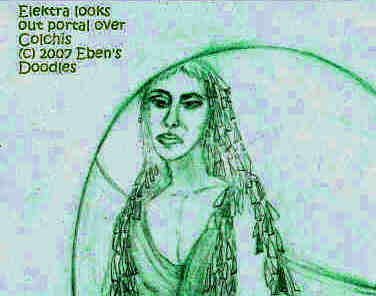
Lesser men would have done any one of those things, without a second thought.
Now many or even most Achaeans had forsaken their forefathers' wisdom and their God and were walking crooked paths in life, but not Jason's parents. They were holdouts for God and decency--while their culture ran an entirely different direction. His father had taught him true things he could not despise and then forget--for they sank into his heart and lived there. That did not mean he could not forget them temporarily. He did forget them for a time.
Now those things came back up, when he needed them most perhaps. It was the epiphany you find mostly in foxholes, but such epiphanies are real, nevertheless.
As he was remembering the God of All in his utter desperation, suddenly
it happened. A word coursed through his inner being, touching him as nothing in the world could touch him, it was so full of majesty and meaning and concern and
even direction for his seeking soul and churning, distressed heart.
The word was God's--he knew in an instant--and it was true, coming from
God himself. When the real thing shows up, there is no mistaking it.
Now note that the Real God did not call the other gods worthless--they were worth something to the Achaeans, or they wouldn't have chosen them over the Real God. But could they deliver, could they rescue, as the Real God could do? Obviously not. In a pinch, they could not muster real help--that was what made them worthless. At all other times, and in better circumsances, they were of varying amounts of help--but in catastrophes, or calamities, or
when you found yourself at your wits' end, mired in a difficulty that the human mind could not solve--forget it--they left you completely in the lurch,
no matter how much of a bribe you paid the priest at the temple or how many oxen you sacrificed on the holy altar. All you got was a mocking devil of a god sneering at your back as you were sent away, with no solution to your problem.
He started off on his search. He had not eaten for two days now, but it did not matter. His skin felt almost feverish, but that was all he felt, for no hunger pangs
bothered him.
Was the grove slowly dying of advanced age? he wondered. The giant oaks all looked extremely aged, and most were hollow, with huge holes in them. Some
were big as houses, and you could quarter a horse or a flock of sheep inside with room to spare for provender. Many holes looked as if they were actually
tunnels, running quite some distance through the live trunks and huge branches. Could the
serpent, or dragon, be hiding and living in the warren of tunnels and hollowed out
trunks? he wondered. Realizing it was possible, he kept a closer eye on each
hole he passed.
Climbing up a patriarch of an oak, that dwarfed even the house-size trunks, he caught his first signt of the monster that guarded the Fleece.
As he wasn't really looking for the dragon, he did not care that it
wasn't friendly and wouldn't let him gawk at it any longer. The only thing he wanted to see was
the Golden Fleece, and so far it had eluded him.
As he continued searching the grove, he began to feel he was being watched,
and even followed. He tried to catch whatever it was that was stalking him,
but he was not fast enough, and he could not move easily in the
trees, they were just too large to get around. By the time he thought he
might catch whatever was following him, it had vanished into a hole or around
another monster oak.
It was like a game of Hide and Seek a Barbarian, much played by children. Only he was grown-up, and it did not suit him anymore. He gripped his sword harder and
moved more carefully.
After what seemed a long time, the light began to dim even more in the forest, and he
saw dusk and nightfall were approaching.
All of a sudden a weight like waist-thick coils of iron dropped on him, slamming him to the ground. He was
almost struck senseless, but he realized he was being attacked by the dragon snake, and
he began to fight. Fortunately, he had not let go of his sword. The loops and coils
quickly began to contract round his body, and he was lifted off the ground. He tried to
get a good swing at his attacker, but it was almost impossible to move as he was
gripped about so tightly and the coils were so powerful he felt as if he could not
possibly fight on against it.
But the coils shifted enough so that his sword arm was freed momentarily, and
lunging up so that he could get his upper torso out, he swung with all his might at a place well below the head, but at the only place he could reach.
Now he knew exactly how it felt! He knew he was dying. He had slain the
monster, but in dying it had killed him!
His life to this point began flashing before his dimming eyes--brighter than the fast fading world around him. He saw all his deeds reviewed, from childhood on. He saw how he had lied, and had stolen a neighbor's ripe apples, and had mistreated a boy he didn't like, and
other such things. Then he saw himself as a young man, and he hadn't always told the truth. He had lied on various occasions to his parents, when he wanted to run free with his friends and do various pranks in the town against various old crones or even old men
living alone
who were helpless to stop them.
What fun that had seemed at the time--but now he saw it was cruelty on his part--as
the old people had suffered just to amuse him and his friends. He had grown older and less mischievous, but he had still done other things he could not be proud of or want other people to know. He had not paid a merchant all he had coming for some provisions he needed for the voyage, and had excused himself at the time, since the merchant had overcharged him
in a previous sale. The merchant had complained, but nobody believed Jason would do anything like that, so he got away with it.
Now these sins--from boyhood up--weighed on him like scorching coals piled in
his chest, and he began to sink--
as if the earth opened up--and darkness engulfed him. It was terrible,
sinking into that darkness, which grew more dark as he descended. The descent
was rapid, then increased in speed to unspeakable degree--he thought he might
be dashed against a rock at the bottom of the gulf in which he was falling.
But he felt himself slowing down--and his terror increased. As he
touched ground, he lay there for a while, wondering where he was. It was
not as dark as the descending chasm, but it was still hard to see. Ahead
of him he saw vast rocks and chasms, lit by fires in the distance.
He wanted nothing to do with any of it, but he knew he had died and become a shade--so
how could he escape? He was doomed! The thought made him despair. He had
died and now he was going to be punished for the sins that had tormented him
in his last moment of life. Now his sins would torment him forever. He had not murdered anyone, or taken someone's wife away, or lived dissolutely as
many young men did by taking many lovers, and drinking much in the taverns, and carousing and rioting, but he had sinned, undeniably. He had lied to his parents, mistreated
people, and cheated a man out of money. His sins, though not
as great as other men's, were enough to bring him to this terrifying place, which he knew had to be Hades.
Suddenly, a word came to him, only it was audible.
Jason, overcome by the sight, fell on his face as before a god.
The being objected, pulling him to his feet.<./h3>
Jason and his guardian moved forward, the doors opened, and they passed
inside them without being attacked. Once inside, the doors clanged shut with a
hideous roaring sound that echoed far across the limitless, darkened cavern and the plains beyond where smoke and fire billowed upwards continually.
As they resumed walking, Jason began hearing a sound of a multitude of
crying and screaming and howling people--all in torment. Where were they? He looked, but it was too dark to see them. Could they be out on the plains, where the quenchless fires burned? But then a rushing sound of a great river overwhelmed the sound of the moaning and screaming multitude, and Jason realized they were approaching a chasm, with a river running at furious speed through it. This seemed as far as they could go.
Here Jason's guardian took him to the right and the ground changed wonderfully. Grass grew, then bushes and trees, and flowers appeared, and everything appeared beautiful, with
no sign of the ugliness and desolation of the surrounding, dark cavern.
Here Jason's guardian stopped. "There are people of the One True God here, but you will not meet them this time. There are even a few from your people, from a long time back. You must not seek them out, for there no time for that now. But let your heart be comforted. You are to be given a gift instead, to bring back with you when you return to the world of living men."
The guardian being did not explain himself. He moved again, with Jason following closely. The guardian reached up with his sword of light and cut a little branch off a fruit tree. But it was unlike any tree in life, as Jason saw it was golden, trunk, branch, flower, and fruit, all purest gold. It was so pure in fact it was gold Jason could see right through. Jason saw through the branches and through the trunk! It was, he realized, an apple tree! The
little branch the guardian cut off, he handed to Jason. Jason took the golden
bough and saw, with amazement, that it held a single fruit still hanging from it.
The guardian looked at Jason. "We must return at once!" he said.
Immediately, he turned, and Jason walked as close to him as he could without tripping over his guardian's legs, and they proceeded the way they had come,
right to the gates, which opened to them as before. This time the gate's
doorkeepers did not attack them, though Jason could hear them growling and hissing and bellowing in rage as they passed through safely and continued on up the road.
Once they were a distance away from the dreadful bronze gate and its immense doors, the guardian stopped. He said to Jason, "Now return, O man!"
"What?" Jason burst out. "How? Don't leave me, please!"
Even as he said this, a rushing wind fell on him, and he was lifted right off his feet, then carried upwards toward the top of the cavern which he could not see for all the darkness and smoke. Fully expecting to be dashed against the rock, he was
hurling upwards at such speed it was some moments before he realized
he was not hitting anything but flying straight as an arrow toward the
world of living men.
"But I am dead!" he thought. "Only a shade, a lifeless leaf of autumn! His eyes closed, he lay on the ground as if he were dead as he thought.
The Argonauts were so happy to see him alive and well that they forgot the
golden apple for the moment, asking instead what had happened to him. Had he
found the Fleece yet? They had seen the serpent-guardian, and it was dead, so
he must of slain it! He had trumphed over the serpent, and the Fleece of Phrixus was his--but where was it? They all were excitedly looking around as this was said.
Getting shakily to his feet, still clutching the golden bough with its apple, Jason tried to gather his thoughts, wondering how they would receive his tale about his recent trip to Hades and back. Would they believe a word of it? He knew Mopsos would not
laugh hastily, but would consider his words carefully. But what did the descent to the Underworld mean? Why had he been taken there, and then given release after being shown his sins during his last moments of life! Surely, his sins would have kept him there forever--but they had not! Why was that?
Jason remembered he had truly died! The dragon had bitten him, and he had
felt death climb all the way to his heart! But how could that be? He had
come back to the world of living men, and he was breathing and moving about and able to talk--so he couldn't be dead! Then he remembered his cry unto the God of his father and forefathers, and the word about God being the God of Escapes from Death. Truly he was escaped from death! But at what price? He had paid nothing for this great favor of God's. What sacrifice could he give to God? It seemed a little late now to
make a suitable sacrific--an animal's life for his own.
Overwhelmed, Jason sat back down, unable to take it all in. Just then there was
a cry, as an Argonaut saw what had just happened to Mopsos. Mopsos had been
stepping round the severed dragon-snake, but had brushed its head, and there was
still enough life in the severed head and section of body attached to it that it had
opened its jaws and seized Mopsos's foot, though the monster was quite dead!
Mopsos shook it off, but Jason was horrified. The next moments brought all the Argonauts
horror. Mopsos, his face showing puzzlement not fear, tried to take a step or two, but fell down. He was dazed by then, his eyes rolling upwards and
his body began to shake and contort, making agonizing gestures as, unable to speak, he tried to get back on his feet. But he could not. He would not rise again to his feet.
As the Argonauts looked on helplessly, Mopsos ceased struggling. His last breath exhaled, he stiffened and then relaxed in Jason's arms.
Weeping unashamed, they carried Mopsos tenderly out of the oak grove and
down to the beach. There, seeing the ship, Jason knew what to do next.
The boys would be fetched from Honan's house where Mopsos had entrusted them to the family, but not told anything on the way across the river. Strangely, when the ship was
gone, the dolphins remained just offshore. Somehow they sensed their master and friend
remained, even if not in sight.
While they waited for the ship's return, Jason and his Argonauts began to build
the pyre. They could not leave their comrade for the night in the open. The pyre was soon made with big stones. Wood was gathered, limbs and small trees, and
then a fire was lit. But they did not do anything more, but sat in vigil by Mopsos's side, with Jason's dolphin cape covering his body.
The ship arrived and was anchored. Jason still did not want the boys told, and, kept on board the ship,
they thought it was only a new game the Argonauts were playing, and did not see
the funereal aspect of the scene.
Jason got his sandal from the ship that he had given Mopsos. He tied it on Mopsos's
right foot. By then the other Argonauts were back from their search for the Fleece. They had still not found it.
Disappointed, Jason felt he had to give it another search. Where would it be?
He had to find it before he left the oak grove forever. He had a funeral pyre to light, and yet he could not do it properly, he felt, without the Fleece. All he had was
the golden apple and the golden bough. He picked the apple, then laid the bough at the feet and the apple
in the hands of Mopsos, and closed them round it. Then he went alone to find the
Fleece.
This time he took no sword. He was no longer afraid, having already tasted death.
He needed to get alone anyway, just to think clearer thoughts.
How could this calamity have struck them, just when victory was so close at hand?
He could not understand it. And why had it happened to Mopsos? Mopsos
was just too valuable a man, and so full of wisdom that they all badly needed!
With him success was assured--as nearly it could be on this faulty, old earth.
Jason continued into the oaks that raised their hideous trunks and
writhing, serpentine branches and boughs all around him, threatening
to hold him hostage forever as he wandered and tried to find a way out
but only got himself more lost.
The forest and the oak grove in particular had devoured many champions, he
could tell by the bones, skulls, shields, sandals, helmets and swords. The
brutes and beasts had eaten everything else. The dragon had slain its share too,
but most had perished, wandering just as he was wandering--with no clear path or
known track out of the maze.
Yet he knew, despite what he saw around him, that he was different from all the rest. What made him different was his God. The others had lesser gods, and had perished.
He had a God who had already proven himself a conqueror of death and Hades!
But why had Mopsos perished!
The grief of the loss of Mopsos was so fierce, Jason bent over at the
thought of it again--retching in his pain. When he felt some relief, he
continued on his search. He had to find the Fleece! They had come so far,
and lost so many comrades--he couldn't possibly turn back empty-handed.
If he had to wander forever, or perish in the forest and among the
hideous, old oaks, that he would do! He was determined to possess the Fleece or
perish in the attempt.
He stopped at a small, brownish stream, and took a handful of water cupped in his
palm. It tasted so bad, he spat it out. At that moment he sensed
something strange--a warm glow on his shoulders and the hair of his head.
He rose and glanced upwards--and there was the Fleece, hanging down from
a bough. He also saw the tail of the long tailed dragon too, realizing with a start that
this was the tree where he had first been attacked by the dragon and slain it.
That was on the other side, and all this time he and the Argonauts had
searched, the Fleece was waiting for them just a few feet round the other side
of the tree!
He wasted no time. He started to climb and reached out when he got
close enough to the Fleece. It astonished him--how brightly it glowed,
with the same kind of gold that the apple of Hade's blest region
had, which you can see through.
Something so beautiful and strange as this is not something you
grab hastily or lightly. Even as he reached, he felt utterly unworthy
of the Prize. What had he done to earn it?
Nothing really! What was a voyage, even if it had been so long and
danger-strewn, to this Fleece that now blazed in his sight?
It was Heaven's Ram's--truly, there was no mistake about that.
No ram or sheep on earth could grow such a fleece--and no craftsman, however
skilled and clever, could craft one to compare.
Phrixus had sacrificed the Ram after arriving safely in Colchis,
he knew. He had accepted that as a boy, and now he thought about it
as a man. What had induced him to do that--gratitude to God merely--
or something more? Jason felt instinctively that it was more to it.
He could not stop gazing at the Fleece, while he hestitated to touch
it. The sight of it was burning into his very soul, as if it were
turning into a window through which he gazed on heaven's glories. But
they were such pure glories--and even his eyes seemed stained with
the sin and folly of earth. He felt unclean before this Fleece of
the Heavenly Ram--beyond anything he had felt touching the
golden apple on its golden bough.
Jason pulled his outstretched hand back. "I can't do it!" he cried. "How can I touch so holy and pure a thing? I might die!"
But he had died! he recalled. God had raised him back to life, and for what purpose? Was it not to take the Golden Fleece?
Suddenly, the rightness of that changed his view of everything.
Mopsos too had been a part of it. His life had been taken--sacrificed like the life of the Ram--so that Jason could be free to take the Fleece and show it, unworthy as he was to bear it, to the old mother of Honan's first and then Medea the princess and thence before the whole world, letting it tell its grand story.
Jason knew he would never be worthy. Mopsos was the worthier man--but he
had been taken and Jason returned to life. But he could not fail Mopsos now. He had to
follow through with it, and take the Fleece in hand and show it to the wide world of men. They would not be able to mock or say it was only a poet's dream--for
they would see it with their own eyes, in the plain light of day. Heaven's glories
would shine on their faces, and silence every skeptic and mocker forever.
Perhaps the One-Sandalled was too positive in his thinking, being still a young man.
The world would always have men enough who would mock the holiest things, even
if it were the Fleece of Phrixus, the pelt of the Heavenly Ram.
Jason, humbled in his mind and spirit, reached up and took hold of the Fleece and
drew it down from the bough where the dragon or Phrixus had hung it.
He knew the way out from this tree, and was soon out of the grove and forest,
his Argonauts staring, as they dropped everything they were doing, to
watch this marvel approaching out of the trees and moving in their direction.
The men did not want to even touch it, and shielded their eyes, but the
grandsons of Phrixus immediately took hold of it, and wanted to
carry it for Jason. They still did not know, so Jason let them play
with it for a bit, then drew them aside.
When he had finished telling them that Mopsos had
been taken from them--not by his own choice--the boys
broke and wept. There was no help for that, and Jason comforted
them as best he could, though Mopsos was always better at that.
Jason could not take the Fleece away from them now. "You are to
carry the Fleece for him," he said. This immediately
strengthened the boys, to think he could do this great service
for the one they loved as their father. "He would have wanted you
to do that for him. You will bear it before us, when we return
to our home country, where you will await your mother while we
send a ship and fetch her from the north. Will you do that?"
They all nodded, and stopped crying.
But now it was time to do a last service to Mopsos's honor and
remains.
The boys carried the Fleece, and the Argonauts
carried Mopsos to the pyre.
They lay him on the stones, and the cape was still spread over him, and the Golden Fleece, Jason took it from the boys, and spread it over the cape.
After a few moments, Jason removed the Fleece, and the fire was lit.
As the fire consumed the hero, for he was a great champion in his
own way without being a man of war, the whole company wept,
even while chanting the Achaean praises of heroes who died
for the honor of their comrades and their country.
They were beautiful verses, and nobody knew who had
devised them, they were so old. But they all knew them
from learning them in their infancy at their mother's breasts.
Then, also in the Achaean way, Orpheus stepped forward,
who despite his oar-ruined hands, could still sing
with art that was beyond any other musician in
all Achaea.
He had a dirge to sing, spun on the moment.
He sang of Wisdom, and her faithful son.
He sang of prowess in silence, and holding
hasty, foolish speeches back.
He sang of kindness to orphans and
the needy.
He sang of grace in a large, ungainly
body--grace and dignity so wonderful that
kings and courtiers in fine robes and
crafted jewels were ashamed before before him.
How rare a man was this--that they were giving
back, with tears, as mere ashes to the earth!
Even the creatures of the sea
would mourn him!
Orpheus sang all this, then finished
abruptly as Mopsos's own life ended,
his clumsey hand breaking
a string on his harp.
Boreus stepped up, but Orphesus
shook his head--he was singing
no more for Mopsos--and handed
him the harp.
The last rite was over, and the Argonauts
sat round the pyre, with the boys
falling to sleep beneath the warm
Fleece of the Heavenly Ram. The flames
of the pyre continued,
the embers of the body of Mopsos glowing
well into the night as the waves lapped gently
at the shore and the dolphins
stayed close by the moored ship, as if
keeping vigil for their tarrying friend.
Was she still living? It did not matter, they were going to return to Honan's
house.
As they came to the house, the Argonauts found that they were not a moment too soon. The old one was, indeed, on her death bed--clinging to life only so that she might
set her remaining eye on the Golden Fleece promised to her by Jason.
How sad, though, that she became blind in both eyes just hours before Jason
arrived.
She had no hope now, but Jason brought the Fleece of the Heavenly Ram in to her anyway. He held it out, calling to her.
Miracle in itself, the old woman revived, and struggled to sit up, with a granddaughter helping her.
"I am at peace! At last! All is well with my soul! All is well!"
Jason could hardly believe what he heard her say, but she had repeated it, and
she really did think all was well with her--despite her murder of a rival. Could it be? he wondered. Could it be a mere touch of the Heavenly Ram's fleece had brought her release from her crime of murder and all the guilt of her sin?
Honan and his family now gathered round the old woman as she breathed her last, and Jason and the Argonauts waited outside, while the family mourned.
It was time for them to go--and so Jason told Honan, when he came out of the house, that they were due back in Achaea's isles. Would he mind if they departed now?
Jason had a gift for Honan, however. He cut off a part of the Fleece and handed it to Honan. "Perhaps you will remember us when you look at it," he said.
Honan nodded, then remembered his guests' needs on their long voyage, and had them brought bread, and smoked veal, and
other foods for their journey, and the Argonauts thanked him, and then set off down the
path, with Honan accompanying them. Honan's son was there already, waiting for them.
Surprised, Jason looked at him, and the boy glanced at his father determinedly, and Honan sighed. Honan turned to Jason. "He wants you to take him as an oarsman, and
I cannot keep him here any longer against his will. Will you take my son along on your voyage? I know you will keep him well, as he grows to manhood. I have taught him all I knew to teach him. He is bright. He can learn many more things from you, if you think him of possible use to you and your ship, Captain. Perhaps, someday he will return here with a ship of his own!"
Jason saw that the boy was nearly a man. He needed something more than the life this
dying part of Colchis had to offer--and truly, the Argo was the only chance for him to
find a better life.
"He may join us," he told the father. As Jason spoke, the boy's glum face (as if he had been expecting a crushing disappointment) broke into such a wide grin of delight that it nearly cracked his lips.
The father and son gave each other parting embraces, and then said their farewells in their own language.
Soon Honan was a speck on the shore as the Argonauts (now including Honan's son who was plying, or trying to ply, an oar) looked back at him. They caught a good current and were moving swiftly toward Aea,
passing many landmarks in the time it had taken many hours to reach on the
way upriver. Only then did Honan's son realize this was a complete separation from his former life and his family, and he forgot he was a man, dropped his oar, and shed t tears.
How did he come to be the keeper? For days after Jason departed the port and city ruled in his absence by his uncle, Peleus, the beggar paid little attention to the sandal Jason had left hanging by its lachet on the name post of the city. Life seemingly was going on the same--but then the beggar's thoughts returned to the sandal. The more he looked at it, and thought about it, he began to see its significance in regard to himself and his own meagre, not very promising prospects.
If he fell too sick to care of himself, what then? He was doomed to perish right there, uncared for, in the street. The street dogs, a wild bunch, would soon find his body and
do what such brutes always did, devour him, starting even before he was completely dead if they saw he was too weak to resist. They were always ravenous--sneaking in toward nightfall from the dumps outside the city
where they scavenged the refuse and garbage--to see what slops--fish heads, bones of lamb roasts, or even contaminated meat-- might be thrown out the kitchen windows by
lazy slaves or wives short on servants who didn't want to make the trip to the dumps outside the city.
Yet along with this dark thought of his certain end, a light began to shine in an unexpected quarter--even this corner of the city by the Mountain Gate. Since Jason had come through and dropped his sandal on top of the old name post, things were, indeed, no longer the same. Only now was the beggar discovering this fact, as he pondered the sandal, and the one who had left it.
Why this one sandal? What good was one sandal on one foot? Two were needed to protect a man's soles from the rough rocks of the paths and streets one travelled from childhood to the grave. Yet Jason had done the unthinkable, shed a sandal--a finely-made one at that, the beggar could see--and gone away unshod on his left foot!
How strange! But how thought-provoking! A man had to have a reason for doing this! the beggar concluded. Unless he were a lunatic, he had a reason--but what was it?
The beggar thought and thought. He even asked a few passers-by, who did not show much interest in the question, and soon left to go on their journeys or business--without another thought about the beggar and his odd question.
So the beggar was left to his own resources. His sleep was even not so good, as the question churned round and round in his dreams. He saw the sandal in those dreams,
spinning, turning, even walking up and down the street--and so he could not avoid the question, whether by day or night.
Somehow, this man and his sandal are destined to some great exploit, that even the likes of me has a part in somehow--the beggar began to surmise. With his slight crack in the darkness of his mind, a golden light began to dawn on the dark horizon. He who had nothing really to look forward to--just the present day in which he hoped for a thrown petty coin or two of little value with which to buy a boiled fish and a few olives and maybe a sip or two of poor, vinegarish wine to slake his hunger and thirst, as well settle his poor digestion.
"That's nice, with the work men present to eat their lunches, they will throw the discards of their bread, olives, and fish to me--and I will feast for days no doubt, without any care for the next day."
But as he eavesdropped on the king's men he realized the changes might not all be so good for himself. They were going to widen the roadbed, double its width in fact, so that the king could drive two chariots abreast in and down the road without
going single file. Apparently, the king had grander prospects than waiting for Jason to return to take the throne from under him. He was not going to give up the city and throne after all? How could this be? the beggar wondered, staring at the
important officials and architect who were on the site, stirring up the dust in a cloud with their horses. A chariot from the king's palace was even brought, then two, and they were positioned at the gate. This gave them an even better idea how much of the street beyond the wall needed widening. One official said, or, rather commanded, "That house has to go--and that garden wall--and that house on the other side too! We can't let them obstruct the way, as the king has ordered the street be straightened as well as made wide enough for two chariots run abreast."
The beggar didn't like the sound of this at all. Must these houses and walls
be torn down? What then? Where was he to move now? Where he was had been so convenient, up against a wall that shaded him from the withering eastern sun. Even if he was to hot in the late morning, relief came soon after that as the shade
of the wall lengthened and covered him. Then if some cool breeze came down from the mountain slopes above and entered the street, he was made even cooler--and
so he had got by in the heat that way. But now the wall was to go! His shade had
evaporated. Where was he to find a similar wall against the eastern sky if the street were widened and the wall knocked down?
The officials and builders and architect paid the beggar no attention of course, and if they saw him, they viewed him with pity and contempt--not throwing one coin his way.
The beggar did not care about it--he didn't like Peleus nor his court and his
servants--they were all so high and mighty, and cared nothing for the poor like himself.
The very important men and their horses went away and the beggar was left
viewing the street. It looked the same, but all had changed for him. He was losing
his place, and with it perhaps his last bit of comfort in this world. What would happen to him, if he had to sit so far away from the Mountain Gate that the passers-by
wouldn't give him anything--thinking only of reaching the markets or their places of business or their homes? Peleus did not permit beggars in the markets and among the shops--he couldn't go there. Only here at the Mountain Gate was he left alone--and now that was over! He was like the garbage and refuse to the king, worth nothing, worth no consideration. How he fared after the street was widened and the gate was enlarged for two chariots to enter abreast, that was of no consequence to the mighty king, Peleus!
The beggar's whole countenance fell, and he sat in deepening despair. "Woe!" he
moaned. "I am undone by the cruel king!"
The only thing he could hope was for Jason to return and set things right. But when would that be? Would that ever happen? The king did not seem to think, shown by his actions, that Jason would survive the hazards of his long sea voyage to Colchis, much less survive the dragon that guarded the Fleece itself. Peleus, in fact, was
enjoying great banquests and festivities in the palace, paid for by the new taxes he levied upon the city and the kingdom.
The city's rich--who supported the king--were growing richer, and the poor were more oppressed than ever.
No one anymore seemed to have a little extra to give the beggar, and he was beginning to starve, going whole days, then several days in a row, without a bit of food. As for wine, that was completely out of the question--he had a hard enough time trying to get some water in his jug. Yet he knew that soon the hired workmen with the slaves and criminals under the king's power would come--which meant some food for him, or did it? Would they keep everything to themselves, having less than before given them by their wives?
Even that looked for boon was drying up, as he considered the new changes at the gate.
What was he to do? He was, he knew, helpless, utterly unable to do anything.
A wave of fear and dread swept over him, and he was drowning in it, unable to
swim and rise to the top!
It was at this point, when everything seemed so hopeless, that the beggar went to sleep in the heat of the day. He was so weak--he could not keep awake now to call out to any of the passers-by in his thin voice.
As he had seen before in dreams, the sandal of Jason the champion appeared, shining with gold, but something else, very golden appeared with it--the fleece of a golden ram, complete with huge curving horns and four hooves! Together they flew from the harbor up to the palace, where he saw men running out to fight, but they threw down their weapons and fled, leaving Peleus--for the king himself had come out with his royal guard--to fend for himself. Peleus then fell down, his robe was swept off him by a big wind, and he ran away down the street naked, the crowds cheering and catcalling, as he passed through them.
This strange dream ended, and the beggar was jolted awake by the sound of many voices. The cracked open his red, heat-swollen eyelids and saw the workmen newly arrived, together with chained criminals and a gang of slaves led by a taskmaster. They were carrying implements to dig and break down the walls and gate and the unwanted houses. The houses were set upon by the king's men, who drove the people out, and there was
much screaming, crying, and protesting, but it did them no good--the king had issued his royal command, and the Mountain Gate and street leading from it would be widened according to his royal architect's measurements and design!
The next couple days passed while the beggar viewed the first work accomplished on the Gate, demolishing it, while the stones that could be used were set aside for
reuse. Carts were taken from owners in the city by royal demand and used to transport the rocks from the quarry outside the city that the quarrymen had already prepared for the Gate and the stone work of the street--for the whole work was to be a splendid
sight, just as the king intended to be done to the waterfront and the agora and the
acopolis (a small outcropping, to be sure) where his palace stood commanding the heights over the city.
Iolkos was going to be made worthy of a king, the great king Peleus!
The beggar watched two criminals approach the name post of the city. What now? the beggar wondered. He called out to them. "Are you taking that away too?"
What business is it of yours, you dog?" the men laughed at him. We aren't taking it away, we are going to break it and throw it with other rubble from that wall behind you into the harbor for the new breakwater the king ordered laid.
Now let us work--or we will get the lash if we aren't seen working!
"No, no! Don't take it away! What is the king thinking of? It is the name of the city, and it is sacred--given us by our forefathers!"
The criminals looked at him with disbelief, and then roared. "What are you
crowing about, you silly old bird? The king's order must be obeyed--and the name--don't you know this city has a new name? Are you crazy?"
"New name?"
"Yes, this city is now Peleos, after the king's own royal name! Now shut your mouth and don't bother us again, or we will knock your head with a rock and throw you in the cart and dump you in the harbor along with the rubble!"
The beggar looked at them and knew they meant their threat, for they were brutes, their crimes well
worthy of the lash and the boot of the jailor.
Slaves and carts lined up along the wall, and then the beggar saw he was going to have to move that very day? But where? Where?
The name stone was struck with mallets, which broke it into handy pieces the criminals threw into the first wagon. A sandal was sent flying--Jason's! Crawling toward it, the beggar seized it, and continued. He tried to keep just out of the work area, so he didn't have to move again that day. In that way he tried to stay as close as he could to his own haunts, but he saw it was fast disappearing. The street bed itself was
hacked up, dug out, and the unusble stones of no value were thrown into the carts for hauling to the king's new breakwater at the new port he was constructing.
The beggar clutched Jason's sandal and moaned, as he thought of the troubles to come.
When the workmen left and the king's men left, he crawled back through the mounds of dirt and hewn and shaped quarry rocks, searching for some scrap of castaway lunch. But he searched in vain, for the dogs always got to the area first, even before the workmen left. Some of the workmen had dogs themselves along with them, and fed them scraps they threw them to make the men laugh as how they scrambled for them.
The beggar was starving--his rags were hanging on his bones, with scarcely anything
covering his bones anymore. His eyes sunk in, the beggar began to see death's Grim Reaper approaching him slowly from the end of the street. As the dark shadows
joined and it became dusk, then night, he felt the breath of the Reaper on his
neck and his forehead. Soon he knew he could not draw his breath--it would be easier not to fight on any longer--he no longer had the strength to struggle to keep alive any longer.
Into a troubled sleep he fell and then dreamed. The golden sandal and the golden fleece which had joined together to drive the wicked king Peleus out of the palace now
resumed their journey and passed down the street to the Mountain Gate. Here they
hovered above him, shining with all their glory.
Without even thinking about it being a strange to do, the beggar began mumbling
a cry, even a prayer, to the God of his forefathers. He had not thought about him since his childhood, when he was still cared for by his aged parents. His mother had taught him about this God of All. Somehow he had forgotten it, lost in all his miseries since he had been forced to go out on the streets to seek a beggar's livelihood (if it could be called a livelihood). That was all he had known--want, and begging to stay barely alive! But now he prayed! He prayed to God--"O Great Father of All, have mercy on me, a dying beggar without any food nor drink! Hear the voice of the oppressed and do justice to the poor and afflicted one. Have mercy on me, and I will serve thee alone!"
The moment he prayed this, he felt a great peace fall upon his trembling, shivering shoulders, and his rags grew warm and kept him warm all night as if they were the finest wool blanket from the bed of the king in his fine palace bedchamber. In the early morning, at cockcrow, the beggar awoke, surprised, for one thing, that he had not been attacked by the wild dogs roving in through the demolished gate, and, next, that there was a jug and a basket lying beside him covered with a fine linen cloth.
He could not believe the sight of them at first. Was it a cruel dream sent to torment a famished, dying beggar? Or was it real?
He reached out his trembling hand and touched them. He gasped--they were real!
He laid aside the linen--and saw loaves of fresh baked bread, a cheese, two fine broiled fishes, and olives and grapes. He tore into the bread first, then was so dry in his mouth he lifted the jug--and it was cold, watered wine--he had never tasted so
fine a vintage!
His weeping could not stop him from eating at the same time--and any passers-by
must have glanced twice at the beggar, wondering what he was up to, and how he had come by so fine a meal--a veritable banquet for a beggar.
The beggar was not even finished with his wonderful banquet--given him by unknown
benefactors in the night--when the unfinished street and gate were filled with people, all talking loudly and gesturing and casting angry looks back toward the hated palace of the oppressor, the tyrant Peleus.
It soon looked to the beggar that the whole city had gathered at the wrecked Mountain Gate. What were they saying?
"It was good the way it was, so why this expensive change!" said one man. "Yes, he's taxing us to death for this needless building of his!" said another. A woman wailed, "I cannot buy my own children food enough to feed them, after these new taxes and levies of the king! What will I do--feed them grass and bark?" Other women joined her, wailing and beating their breasts. The men grew all the more excited and angry, shaking their fists. Some held pitchforks, knives, and clubs, anything that could be used as a weapon.
After the noise grew even louder, and the clamor increased with new additions of citizenry--people even coming in from the country to join the crowd--the king's men came on horseback, shaking their fists, commanding them to disperse at once. "The king orders you back to your homes and work places at once! A whip for the back of every man, and forty lashes, if you don't go immediately!"
The crowd, which was now in the hundreds, jeered, united in one voice and
in anger against the tyrant and his men.
They surged forward as if to pull the king's men from their horses, and the
king's soldiers, lashing at the hands that grabbed at them and their horse,
suddenly galloped away back to the palace, dozens of men running after them and pelting them with rocks.
The crowd continued its gathering for quite some time, but when the king did not send any more soldiers, their anger began to wane, for there was nothing to take their anger out on. Within another hour the whole area emptied, leaving the beggar alone with his thoughts, Jason's sandal, and his strange and wonderful provision.
The beggar was happy as a awallow in springtime. He now had enough for several days--and could forget
starvation for a time. He had no idea how he had been spared a most miserable death, and being devoured by the wild dogs, but he was thankful. A thought came to him: why not thank God for his miraculous repast?
So he did, right there in the daylight hours--he raised his clasped hands toward heaven and thanked the Father of All.
After that day, there came news via a passer-by. The king, badly frightened by the uprising of the whole city, had called back his levies and new taxes. He wasn't going to enlarge the Mountain Gate and widen the street after all. What was done would be repaired and returned to its former condition.
As for the king, he had heard something else--that the beggar at the gate was the reason for the disturbance that nearly cost him his throne. The people were defending the beggar, who had been cast from his begging post, along with the post!
Then, just as this welcome news came to the beggar, even better news reached his ears. He had been declared the king's ward! The same day, mats arrived from the palace for him to rest upon, together with a canopy to shelter him from the sun's burning rays at noontide and during the long afternoon. Food as well arrived, via the slaves and cooks of the palace kitchen. He had more than enough now--and again the beggar clasped his hands toward heaven, and no matter who was present, poured out this thanks to the Father of All as His great provider and benefactor.
And it was so as the Voice promised the beggar. Jason arrived at last one fine day (which was the end of Peleus, to be sure, who had reigned most wickedly and cruelly all the time Jason had been absent from his kingdom). The false king was routed out by the one carrying the Golden Fleece on his mighty shoulders, his adopted sons, the grandson of the great Phrixusd, holding the train of the Fleece. Laughing and jeering and rejoicing the people of Iolkos jeered and hooted at Peleus as he ran, barefoot, down the street to get away. No one of his former court or any his rich friends lifted a finger to help him, for they were afraid now of Jason being king and holding them responsible for their
part of the king's misrule and oppression of the people.
Justice and judgment, along with mercy, were restored by the kingship of Jason. The crimes that Peleus had committed against many innocent men were rectified as much as possible. Widows who had been defrauded (and their husbands or sons murdered by the king's order) were given their property back.
He also retrieved his sandal from the beggar, sending for him and bringing him to the palace in a royal chariot! In a royal audience, before all the assembled Argonauts and the people, Jason said to the beggar:
"I heard of you from the people! You were the one I first met in my city, for you
guarded the Mountain Gate, did you not? You kept my sandal safe--and now, as reward for your faithfulness, I fulfill my vow I made when I left it at the name post--that whoever
honored me in this city from the time I hung my left sandal on the name post would be richly
rewarded! Well, you are the man! You are the man!" You honored me, a stranger to you, and now I will honor you in return!
King Jason offered the beggar a place for life in the palace, and his own rooms, and
all his food and drink and clothing. The beggar, knowing a good thing when he saw it, immediately accepted.
Nothing was spared his needs, and unlike many ungrateful men blessed with suddenly improved fortunes, he was most thankful to the giver, but also
giving thanks to God, the Father of All, to the end of his remaining days.
Now and then he would go by chariot or litter to see the Mountain Gate where he formerly resided for many, many hard years of dearth and suffering. But Jason had made it most beautiful, building it with fine stones and carvings of the Golden Fleece, the Ship of the Argonauts sailing across the lintel--even a figured carving of the exploits of
various Argonauts, and a saying that the wise Mopsos would have approved, which said for men of that time and succeeding ages:
So this single-file gate leading to and from the mountains overlooking Iolkos, as long as it stood, would teach that wise lesson and the wisdom of Mopsos to all men who would listen, to all men who wanted to live and not die.
One such champion was Epathroditos of Lindos. A chain of gold with a Nike-emblazoned medal was hung round his neck, and he was given a wreath of victory, made of sacred laurel, to wear on his head. Lifted to the shoulders of his closest contenders for the supreme prize, they carried him from the running field and stadium of the games through the city center and then through the streets as the huge crowd gathered for the games from all over rejoiced and celebrated his achievement.
He was treated with all the honors of a god, and felt like one. His name was immortal, and he would be awarded a statue modeled on himself, which would be set up along the main avenue with the statues of other winning champions of past games. The world would see him as he was in his full strength and youthful perfection.
At the milestone that stood at the end of the main street, however, and old man stood
waiting as the champion was carried there, to be carried back to the city center and set on a throne set up before the main temple where the statues of champions were erected.
There he was to receive his gifts from the city--gold, fine robes, even lands and vineyards for his future prosperity and legacy--he would enjoy his prize as a rich man the rest of his days! Who could be happier than Epathroditus?
The old man cried out to the champion the moment he was close, "O Youth, remember age!"
Despite all the cheering, sounds of harps, and confusion of the crowds at his back, the champion heard the man's words.
"What?" he said. The old man repeated himself.
"Set me down!" the champion commanded his bearers. They hastily returned him to the humble earth where ordinary folk live.
The champion waited as the old man gathered his thoughts and then spoke again. He pointed back toward the city's agora. "There is my statue down there in the Agora, if you look for it! I once was like you--a hero full of youth and glory and honor! Look at me now! Do you see a great hero? Ha! This is coming for you--age and decay and death--and even the forgetfulness of men. I am forgotten! My own family has turned me out into the street, after taking my fine house and vineyards and cattle for their own use! I am ill, and too old to stop them--so they turned me out like a dog too old to
be any good to its master.
No one pays me any heed now, though people still admire my marble likeness! Do not
be taken away by this vanity you now enjoy! It will end like this--a legacy of ashes!"
The old man's words were like cold baths of water, dashed repeatedly in his face. The champion could not dispute a single word. Surely, the old one knew what he was talking about! So, what was he to do now?
The champion bowed to the old man, then turned around to face the crowd of admirers.
Walking back to the Agora on his own bare feet, the hero of the Games went to the
pavilion erected for the giving of gifts. He climbed up as the crowds roared, cheering
and praising him extravagantly as before. Only a few knew what the old man had said that cast such a strange expression on the champion's face, as a dark rain cloud casts on the bright earth before the sky thunders and lightning flashes. He was no longer smiling as before. He looked very sober and grave--a far cry from how he should be taking things as glorious as this day's events and celebrations!
Epahtroditus raised his hand, and the crowds fell silent, all across the Agora and even to the tops of the temples and public buildings where people had climbed for
a view of everything.
"Beloved countrymen, listen to me. You all love me greatly this day, so do as I say, and refuse me nothing. Bring the poor here at once. I will not keep your
fine gifts. Let them have them in my stead. This is my command."
No hero and champion of the Games had never done this before, though the Games had been played for many centuries past counting. No one could understand such a command, but they, nevertheless, obeyed him immediately. The beggars from the gate, and some impoverished widows, were brought before him at the grand pavilion where he sat on a golden throne--a king's own chair brought from a palace.
"Give the gifts to them!" the champion directed like the king for a day that he was.
It was done as he commanded.
The crowd was restless, some people cheering, some arguing, others protesting that he should not give away such fine gifts as gold and jewels and fine clothes to dirty, low beggars and wretched widows who had no one, not even family, to put a roof over their heads.
The champion raised his hand a second time. Again, respectful silence.
"I have once last thing to say, my beloved countrymen." He removed his golden medal and chain from his neck.
"Age will rob me of this in time, so I will not wait for that to happen. I give it back-to heaven, for all glory belongs there anyway. I will not seek to hold what I cannot keep. Only a fool would do that! And since you all know me here, I must seek another country, another city. Farewell!"
Astonishing everyone, the champion gave a wave to the crowd, climbed up to an altar, and threw the gold medal of his triumph onto the flames. Then he turned back down the marble steps, jumped into the midst of the crowd,
and was last seen heading toward a city gate that opened into the countryside. Where he went, no one knew, as his own family could not tell those who came to inquire in the days following.
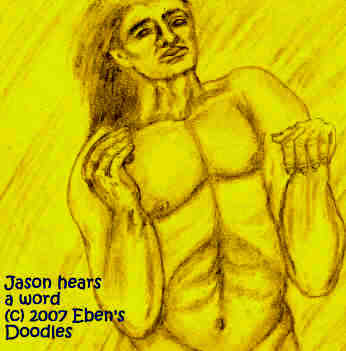
"I am the God of escapes from death. Do not fear, I will go with you,
even unto the end. Though you walk through the valley of the shadow of death,
it will not touch you. I will deliver you, and bring you in to a broad
place and a safe haven. You will tell of My
Name and my greatness to your generation, and to the next, and the next--
for your deeds will be told to all coming ages. Follow Me only--and do not
turn aside to any of the gods of your people."
It is odd sometimes, how words can affect a person. His bare right foot reminded him, as he looked at it, that he had given Mopsos his remaining sandal. But there were sandals lying around, together with swords, shields, and helmets. He picked up one sandal and tied it on his right foot. Somehow it reassured him, that
everything was going to be all right. Humanity finds simple comfort enough in such
things, it seems, as Jason did in this sandal when he felt deserted by all the gods of his people and culture.
His search took him deep into the grove, and he saw why it would have been no good taking anyone with him--they would soon have parted company in the tangled
labyrinth of giant trunks and roots, where daylight seldom penetrated.
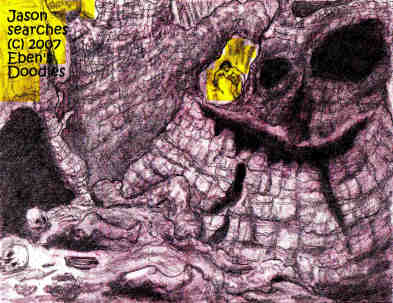
Far overhead, above the thick canopy of leaves and boughs and branches, there was light, but the floor of the grove was almost all shaded.
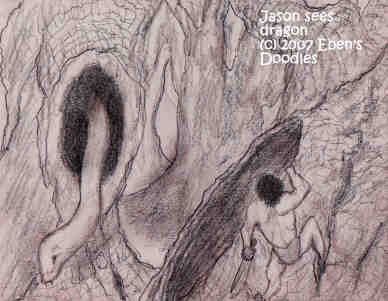
It did not give him
much chance of a look at it. One moment it darted out, then it must have sensed
his presence and scrutiny, for it withdrew so quickly he wondered if he were imagining things.
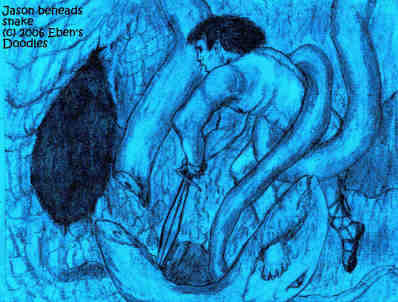
The snake had his foot, however, in its mouth. Even in death, the monster's venom flowed, and Jason's wounded foot was poisoned.
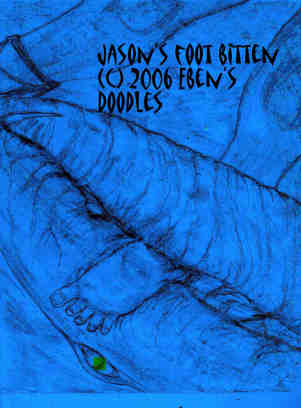
Dropped from the relaxing coils of the dying dragon, Jason lay on the ground dazed. He felt icy cold spreading from his foot up his leg--like poison hemock
did to murderers and robbers in jail who were being executed by forcing them to drink a cup of the deadly
hemlock juice.
"You are not going to dwell here among the dead. Follow Me!"
Jason was thunderstruck. Follow whom?
He no sooner thought that then a blazing light appeared. He could scarcely look at it. Then he saw it was moving toward him, carrying a sword. Jason
was just as terrified by this sight as he was by what had happened to him to this point. But the being that carried the sword spoke to him.
"Do not worship me, but follow me closely, and do not step aside, or you will perish here with the others!"
Jason stepped close to the blazing figure, which looked like a man
with fire coming out of his head where hair would grow on a man, and he held his footing in step with the being. Together, they moved toward the vast bronze gate. Monsters shaped like bulls with horns and cloven feet but also formed like biting serpents too, rushed out at them as soon as they drew near to
the doors. The being that guarded Jason raised his sword, which sent out
lightning like bolts of brightness, and the monsters fell back, howling, bellowing, and
hissing and shielding their eyes with their hooves or claws.
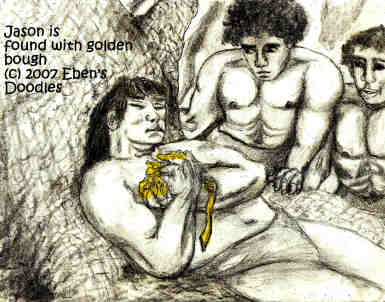
Jason awoke, finding he was mistaken. He was not dead after all. Mopsos and the other Argonauts were looking at him, transfixed at the sight of what he was clutching
hard against his chest. He had forgotten it entirely. He opened his hand, and
there was the branch with the golden fruit attached! He had been given a golden bough from the apple tree, and he still had it! He really had gone to Hades, to the
blest part where the golden apples flourished for the comfort of those counted worthy of them, and...he was so overcome, he could not help but stare at the apple.
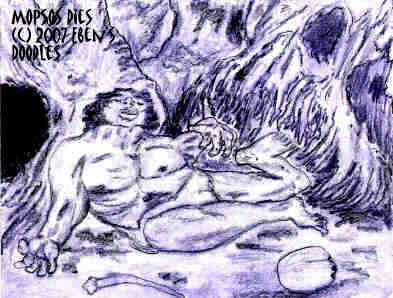
It had all happened so quickly they were all stunned, and Jason
just as much as the others. How brief, how suddenly cut off, a man's life could be!
Broken in the very flower of his youth! His vigor and wisdom and experience
meant nothing now--Mopsos had descended to the dread realm of Hades hidden under the earth!
Achaeans could mourn their losses of comrades, and they mourned now--not
needing to put it off for a less convenient time.
The Greeks, starting with their predecessors, the Minoans of Crete (or Keftiu, the Princes Island), and continuing with the Mycenaeans, then the Achaeans (the mysterious Dorians), and then the world-conquering Macedonians led by Alexander the Great, finally on to the classical Greeks of Pericles, Socrates, Demosthenes, Plato, Aristotle, and others too numerous to mention--a race of epic deeds and epic character flaws immortalized by Homer and continuing on to
the decadent, pleasure-loving, inebriated, crumbling-from-within Greece the Romans knew and conquered--this entire calvalcade of many-splendored peoples missed the whole point about their own stars, constellations, and the matchless, wonderful accounts they had inherited from more ancient times and peoples. Encapsulated in one moment, perhaps, that lost greatness, that Magnum Mysterium, that was only later to be lived and explained in word and deed by a certain carpenter's son from a nothing of a town in northern Israel--until then, there was for succeeding generations only the fading brightness of the glory Jason and his Argonauts and the four grandsons of Phrixus (all destined orphans, like us!) once bore home triumphantly on the bow of their ship the Argo:
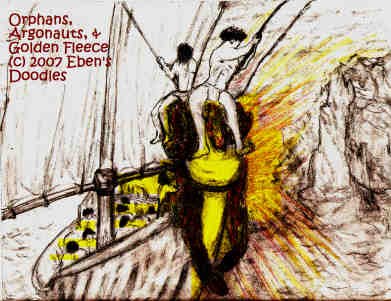
But what price glory? All the surviving Argonauts, as well as Jason and his four adopted sons, the grandsons of Phrixus, carried home the memory of Mopsos and his pyre burning far into the night as they lifted their weapons in salute and sang victory songs fit for champions in his honor.

But before turning toward the isles of home, the Argonauts had one last duty to perform, which Jason could not ignore or cast aside. He had promised Honan's mother her dying wish.
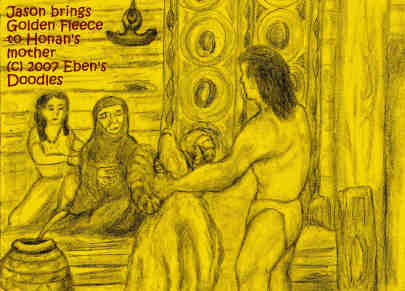
She was weeping from both her blind eyes as she felt the fleece with her
trembling fingers. Finally, too exhausted to sit any longer, she sank back onto her bed. She was whispering something, and Jason bent close to hear.

Even as the fire and smoke carried the eulogies and songs honoring the the great Mopsos up into the sky, far off from razor-peaked Colchis the beggar of the Mountain Gate in Iolkos
stood vigil, for he had appointed himself keeper of the sandal of the champion, Jason, who had set sail with fifty heroes to go and win the Golden Fleece in the legendary land of gold, dragons, and sacred groves--Colchis.
One day his whole life was overturned in a few moments. Peleus's men came to inspect the Mountain Gate, taking the measurements, and when he heard them talking, he realized the king had some major changes in mind for it.
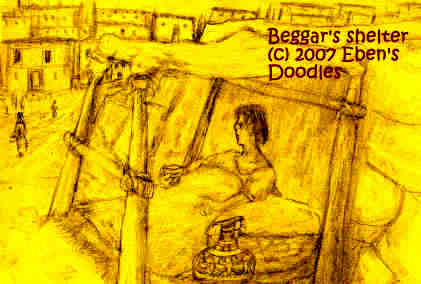
That very night as the beggar slept like a baby beneath the clean, warm, fine-smelling woolen blanket brought from the palace, he heard a voice call him: "My son, your prayer is heard, and I have answered you. You have been faithful in little, and now I will put you over much. Your affliction is comforted, and I will bestow even more favor upon you. I will send another benefactor to
take you to the palace of the king, where you will abide until your end. Be at peace! Rest in my hands!"
"O Wayfarer Passing Through the Narrow Gate, Seek First God and His Righteousness, and All Things Good and Happy will be added unto you!
It was a popular gate from that time on. People who passed through it felt a blessing fall upon them--unless they were wicked, bent on committing some evil deed either in the city or out of it. The old name fell away. It began to be called "Happy Gate," and so it remained for as long as the gate stood there.
Jason, moreover, returned it to its narrow state as a gate for only one man to enter or exit at a time. He did this purposely, not to make it inconvenient for the city but because he remembered that Mopsos had once told him, "Narrow is the gate that leads to life, and few there be that find it. But broad is the way that leads to a man's destruction. Many, alas, many go to destruction, taking the easier way in life, thinking they are safer travelling together, like fish in a school!"
Centuries after Jason's return and rule over his city and kingdom,
the games of Greece were celebrated, at famous sites such as Delos, Delphi, Thebes, Corinth, and Olympos. The winners were treated, for a day or so, as gods of Olympos the sacred mountain of the Greek gods where they were thought to reside at the court of Zeus, the chief god.
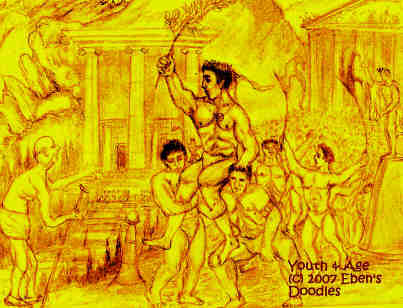
The champion's heart suddenly sank. The sky seemed to darken as the meaning struck him like a thunderbolt. "What do you mean, Old One? Remember age? Explain yourself!" he stammered.

Retro Star Directory and Linking Page

(c) 2007, Butterfly Productions, All Rights Reserved
